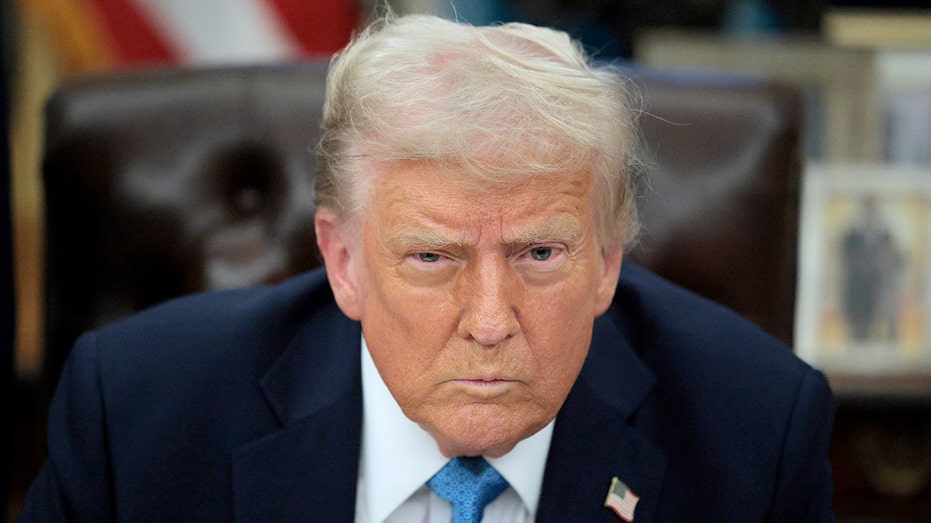Judge blocks Trump’s order forcing incarcerated transgender women to live in male facilities
A judge on Tuesday temporarily blocked President Trump’s executive order mandating that transgender women in federal prison be housed in male facilities and the government stop funding their gender-affirming care. After a hearing in Washington, D.C., earlier in the day, U.S. District Judge Royce Lamberth granted a temporary restraining order Tuesday evening requested by three anonymous transgender women...

A judge on Tuesday temporarily blocked President Trump’s executive order mandating that transgender women in federal prison be housed in male facilities and the government stop funding their gender-affirming care.
After a hearing in Washington, D.C., earlier in the day, U.S. District Judge Royce Lamberth granted a temporary restraining order Tuesday evening requested by three anonymous transgender women inmates.
Lamberth found they were likely to succeed in their claims that Trump’s order violates the Eighth Amendment’s protections against cruel and unusual punishment.
“It is, of course, possible that further briefing of the constitutional issues at the center of this dispute, or factual discovery, will eventually yield a different outcome. But the plaintiffs, through their largely undisputed factual allegations and proffered affidavits, have met their burden to show a likelihood of success on the merits,” Lamberth wrote in his ruling.
Lamberth, an appointee of former President Reagan, said he was not reaching the plaintiffs’ other arguments that the order violates the Administrative Procedure Act and the Constitution’s equal protection guarantee.
Trump signed the order as part of a blitz of executive actions on his first day in office, billing it as “defending women from gender ideology.” The lawsuit is now one of nearly three dozen pending lawsuits challenging the new administration’s policies.
Lamberth’s order comes after a federal judge in Boston last week blocked prison officials from transferring a transgender woman, who similarly sued over Trump’s order. But that ruling only applied to the specific inmate, while Tuesday’s new order in D.C. restrains officials from “implementing” the challenged provisions until the next stage of the case.
As the three transgender inmates asked Lamberth for the emergency intervention, the Justice Department contended there were multiple procedural bars to the plaintiffs’ case. At Tuesday’s hearing, Justice Department attorney John Robinson said the inmates failed to exhaust their administrative remedies and that the facility transfer decisions at the center of the case are not subject to judicial review.
Robinson further asserted the court’s intervention would be premature because the Bureau of Prisons (BOP) is still revising its policies to align with Trump’s directives. He stressed government data indicating that of the 1,506 female-identifying transgender inmates currently in BOP custody, only 16 are housed in women’s facilities.
“No medical care has been denied yet, and that claim is premature,” Robinson added.
The judge rejected those arguments, finding the plaintiffs’ case fell under a rare exception that allows their case to move forward.
The Justice Department has defended the order by emphasizing the government's legitimate interests in protecting inmates’ safety, security and privacy, but Lamberth said the plaintiffs had met the other factors courts consider when granting temporary injunctions.
"The public interest in seeing the plaintiffs relocated immediately to male facilities is slight at best,” Lambert wrote.
“And it is hard to cognize of any public interest in the immediate cessation of their hormone therapy — aside, perhaps, from whatever small sum of money the BOP may save by ceasing administration of these drugs, or the abstract interest in the enforcement of Executive Branch policy decision,” the judge continued. “The plaintiffs' interests, on the other hand, are not abstract at all.”
Jennifer Levi, who represents the plaintiffs in both cases, raised alarm at Tuesday’s hearing that the transfers would put her clients at greater risk of sexual assault.
The three inmates who sued in the D.C. case said they were rapidly moved out of the general prison population to segregated units after Trump’s order and expect to imminently be transferred to a male facility. Levi said they were “terrified” and could soon lose access to their hormone treatments.
“It’s predicated on a premise that rejects that transgender people exist,” said Levi, senior director of transgender and queer rights at GLAD.

















_Agata_Gładykowska_Alamy.jpg?#)























































